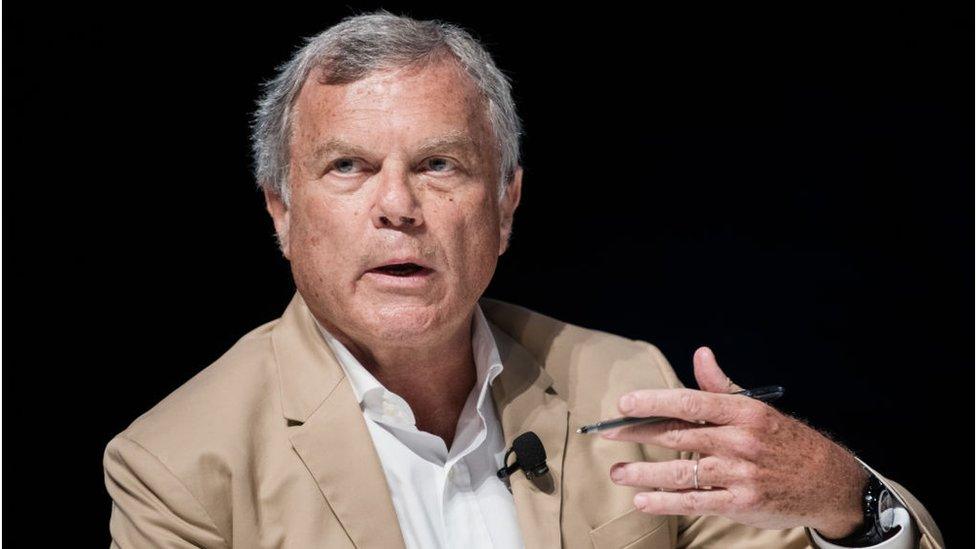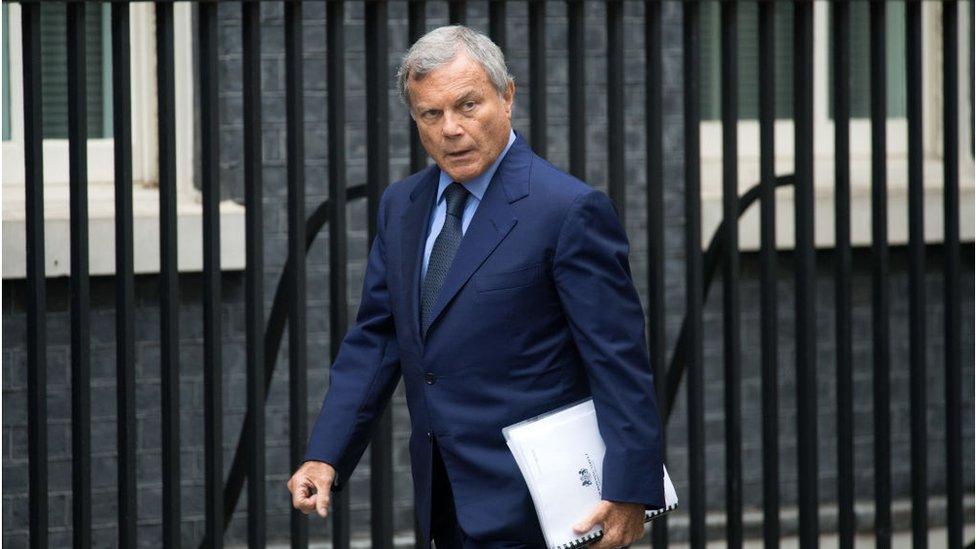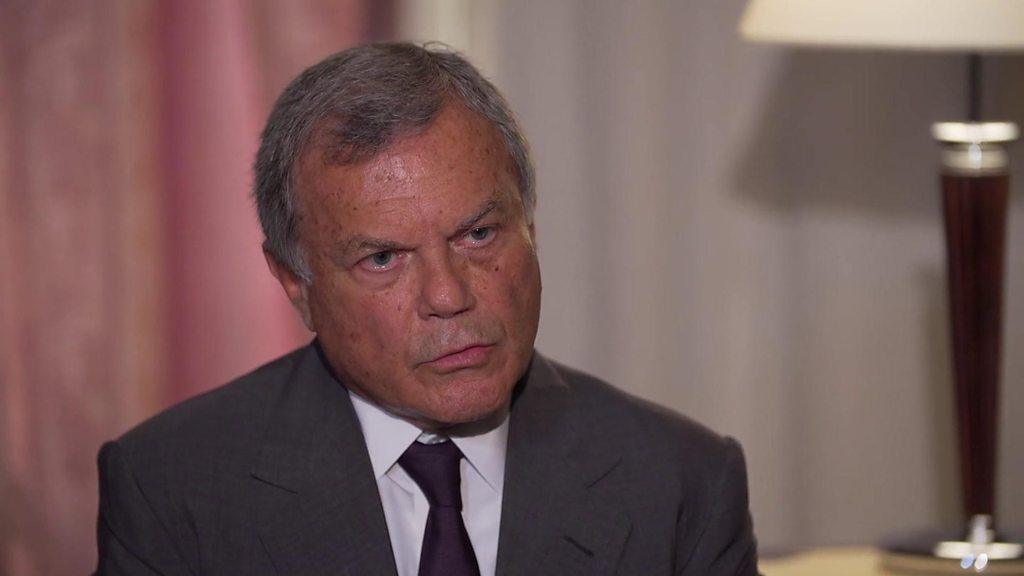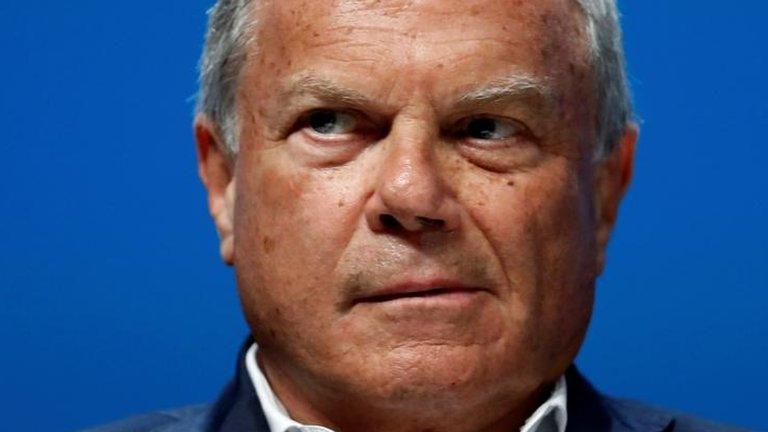Defiant Sorrell defends legacy as he builds new empire
- Published
Martin Sorrell addresses WPP allegations
Sir Martin Sorrell has defended his behaviour while in charge of WPP in an exclusive interview with the BBC.
Sir Martin, who built a £15bn advertising giant from an old shopping basket company, said his only regret was the way WPP handled his departure.
He left amid allegations of bullying subordinates and using company funds to pay for prostitutes.
He strenuously denies those charges and points to a company investigation which found no material misconduct.
As a result, he was able to leave and remain eligible for continued bonus payments for the next four years.
No apology
If anyone was expecting an apology from Sir Martin Sorrell, they will be disappointed.
After 33 years, one of the very few UK business leaders known around the world left suddenly and dramatically under a cloud of controversy - and a shroud of secrecy.
It was a spectacular fall from grace, a classic tale of hubris according to his detractors.
The allegations against him were many but his response was defiant.
Poor treatment of subordinates? - "Not true."
Sacking a driver because he wouldn't pick his wife up at 2am? - "Not true."
Spending £274,000 of company money on travel expenses for his wife in a year he was paid £70m? - "True, but it was agreed, and she made an important contribution to the company."
Using company money to pay for prostitutes? - "Not true. There was an investigation and it turned up nothing."
How about running the company like an emperor when in fact it was a public company of which he owned less than 2%?
This is where there is a tacit admission that he didn't behave like your average chief executive - but for understandable reasons, he argued.
'It's your baby'
"Founding a company is the nearest a man can come to giving birth. Emotionally rather than physically obviously - but it's your baby."
That is Sorrell's explanation of why he admits he micro-managed WPP - a company with 200,000 employees.
"I asked myself this question - who is really looking out for this company? And the answer is, no one apart from me. And by the way, micro-management is not a fault."
That's not what the head of one of the many companies he owned told me.
"Sir Martin's departure from WPP will be liberating for employees," said Steve Allen, head of Mediacom, when Sir Martin left in April.
What did he make of that? - "I was perplexed by that comment," Sir Martin replied.
Defiant - and not about to go quietly into obscurity.
At the age of 73, Sir Martin is having another "baby".
S4 Capital was founded with £40m of his own money and up to £150m of other people's.

Sir Martin is building a new digital empire with S4
The new empire is already under construction.
He bought digital agency Mediamonks from under the noses of his old firm - a move that WPP sources say is a breach of his departure terms, and may result in the company trying to stop £19m in payments that Sir Martin is still owed for previous years' service.
His new strategy is pretty simple.
He quotes legendary investor Warren Buffett - Sorrell is very fond of quoting very rich people, so Buffett and Amazon founder Bezos come up a lot.
The advertising world of the last 30 years was built on the growth of US-based multinationals around the world - WPP benefitted hugely from that growth.
S4 intends to piggyback on the growth of a few very powerful companies.
S4 is a way of earning a royalty on the future of seven companies - Amazon, Apple, Google, Facebook, Microsoft, Alibaba and Tencent, he says.
"The seven sisters," he calls them. "Having a small company like S4 we can respond quickly to the fortunes of these companies."
But why bother? He's got hundreds of millions of pounds, his children are very successful in their own right, and he's 73 - is it revenge?
He laughs: "There may be a bit of that - but what I'm most interested in is building a business to scale.
"Some people found things and move on, others build businesses, very few can do both."
Thoughts on Brexit
What does this globetrotting dealmaker make of the UK's future post-Brexit?
The primary focus after Brexit shouldn't be Europe - it will have to be Asia, South America and the Middle East, he says.
We need to think like him. "Focus on Asia - become like Singapore."
Does that mean low tax, low regulation? "Exactly," says Sir Martin.

Sir Martin met with Theresa May and other business leaders at Downing Street in October 2017
There are few industries in the UK which rely as heavily on foreign talent as much as advertising and media.
The creative agencies which he once collected are chock-a-block of EU and non-EU migrants. The prospect of Brexit is already proving a turn-off, says Sir Martin.
"There's no doubt that the UK is less attractive to investors and to EU and non-EU staff. It is a real worry and flies in the face of some of the pro-business things Theresa May has been saying."
Rose-tinted glasses
There is no doubt that Sir Martin Sorrell remains a giant of the advertising world.
His drive and deal-making appetite show no sign of fading.
But for many in the advertising world, his legacy is one that took creativity out of a creative industry. When he talks about his new ambitions, traditional creative ad agencies don't figure at all.
Again, he bats away the criticism.
"There are new forms of creativity in things like data analysis, in digital transformation. People look back at the Don Draper/madmen-era with rose-tinted glasses," he says.
Some in the industry will think his own view of what he did for the advertising business is rose-tinted as well.
I doubt he would care. After all - he's got a new baby to look after.
- Published29 September 2018

- Published10 July 2018
- Published10 July 2018
